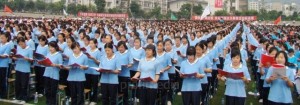State Power, Progressive Social Movement and Educational NGOs in China
Zhou Yong, He Shanyun and their research group have been working hard in understanding Chinese educational NGOs from broad political and social perspectives.

the Chinese educational NGOs growing up in Chinese political social transformation are the partner of the state power which also wants to reshape the society towards democracy and justice.
Since May, 2011, Zhou Yong and his assistants have flied to Beijing, Nanjing, Hangzhou, and have discussed with many Chinese sociologists, historians, and educational sociologists. The research group also has finished another round of reading theoretical references authored by Chinese and western leading sociologists and historians whose works are quite significant for us to understand the political and social transformation in contemporary China.
Stimulated by the drastic democratic movement in 1980s, “Civil Society” and “Public Sphere” has been introduced by many western and Chinese historians since 1990s. However, it is quite clear that there is no real civil society or public sphere in China. For understanding the fact of contemporary Chinese political and social transformation, the more accurate conception is “Emergence of Civil Society or Public Sphere”.
There is no doubt that in China, the society is still strictly controlled by the government. But the central authority’s drive toward changing its centralized economical system in past 30 years has not only created the miracle of economical development, and severe social crisis, but also provided vast space for the individuals in Chinese society. Sun Liping, the leading sociologist from Qinghua University argues that, like what happened in New Deal in 1930s in America, the Chinese government and people, at this crucial changing time, also need to initiate “a social reconstruction movement” dealing with the crisis caused by economical development. In recent ten years, the Chinese society has witnessed thousands of justice oriented and progressive intellectuals and citizens who are very active in finding their ways to make nonprofit progressive social contributions, indicating that civil society is indeed emerging. At the same time, the central political leaders have also made many decisions to solve social crisis, and build the “Harmony Society” in China. Moreover, the central government is well informed that this huge work can not be done by itself. We can conclude that, in contemporary China, the good partnership can be established between the state power and the real justice oriented or progressive Chinese social movements
The Chinese educational NGOs’ actions should be studied within the above political social context, which means that the Chinese educational NGOs are not one part of any forms of independent social power which aims to fight against state power, or build a free society. On the contrary, the Chinese educational NGOs growing up in Chinese political social transformation are the partner of the state power which also wants to reshape the society towards democracy and justice. The problem is that the central government is not the God who has the ability to know every non-government institution entitled education. Meanwhile, it is also difficult for the real just oriented educational NGO to be understood by the central government, and get more trust and better financial policies for the latter.
It deserves to mention that, in last month, the research group hosted two American Sociologists of education of UCLA. One is Val Rust, and other Peter Mcralen. They are widely known among the leading university educational schools in China, and had good conversations about progressive education and social development with educational scholars and graduate students. The difference is that Val and Peter can set up their own NGO, their Chinese counterparts prefer to working in the institution provided by the government. This also indicates that developing good partnership is very important for the Chinese progressive agents who are working within contemporary Chinese political social context.
Tags: Activism, Development, Policy
